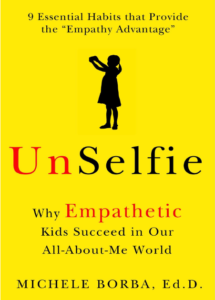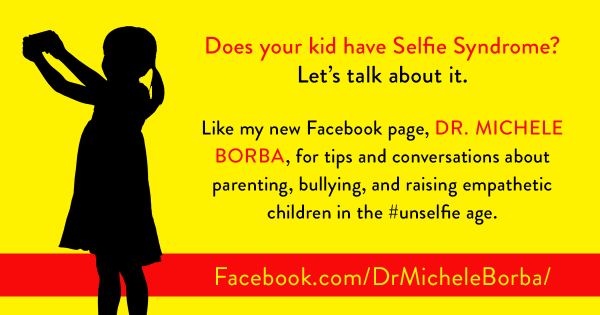Last week I joined with NBC’s Education Nation to have another hour-long Twitter chat that focused on tips from my new book, UnSelfie: Why Empathetic Kids Succeed in Our All-About-Me World. Since the book launched just a few weeks ago I’ve spoken to crowds of parents and educators in Boston, Richmond, New York, Jacksonville, Los Angeles, St. Augustine, San Francisco, San Diego, Dallas, Austin, Las Vegas, Chicago (phew.. and more). I’m thrilled to say that the topic of cultivating empathy in our children is resonating with parents and educators alike.
 Writing UnSelfie was a personal ten-year journey to discover how we can cultivate empathy in our children. This blog is the second in a series in which I share facts and tips that I posed on that hour long twitter with Education Nation. (See this link for Part I). My feeds alone were retweeted by over a quarter of a million people. That goes goes to show you the power of social media. My goal is move the dial in how we raise our children so we stress BOTH sides of the report card. We must recognize the importance of nurturing empathy in our children, why it matters, and simple ways to do so.
Writing UnSelfie was a personal ten-year journey to discover how we can cultivate empathy in our children. This blog is the second in a series in which I share facts and tips that I posed on that hour long twitter with Education Nation. (See this link for Part I). My feeds alone were retweeted by over a quarter of a million people. That goes goes to show you the power of social media. My goal is move the dial in how we raise our children so we stress BOTH sides of the report card. We must recognize the importance of nurturing empathy in our children, why it matters, and simple ways to do so.
Here are more questions the folks at NBC’s Education Nation asked me and my responses. All of these responses are explained in depth in UnSelfie (which also offers not only the latest research on empathy-building but also dozens of practical ways educators and teachers can cultivate children’s human capacities). I will continue to be blogging about the power of empathy as well as ways to nurture it in our schools, homes and communities.
For more ideas, please visit my Facebook and Twitter account. I hope you’ll join me in starting an UnSelfie Revolution so we raise kids who think WE, not ME (and are healthier and happier because of it).

Eighty percent of kids says their parents are more concerned about their achievement or happiness than caring for others via Making Caring Common at Harvard. Messages about empathy don’t seem to be getting through to kids. How can parents address this rhetoric vs reality gap?
- Think about the messages you send your kids. What do you praise? If it’s always about grades, achievement, and sports, it may be time to switch your emphasis.
- We’re proud of our kid’s successes, but we focus on cognitive/social/physical feats and overlook emotional/moral sides.
- We tend to overlook kids’ moral accomplishments: compassion, generosity, thoughtfulness and concern for others. Nurturing both sides of the report are crucial for our children’s success and happiness.
- Overpraising can make kids competitive, tear others down, diminish empathy and increase narcissism.
- If we are serious about raising a kindhearted generation, our expectations for caring must be clear.
- If we want empathetic kids, we must help them see themselves as people who care and value others
- Model kindness to your kids: offer ur seat on the bus, phone a pal who is down, ask how someone is feeling.
- Push the pause button and listen to your dialogue. What portion of your messages address achievement vs kindness?
Does teaching and practicing empathy look different for kids at different ages? If so, how?
- There are strategies that work for all ages but others are better to use with older verses younger kids. Best are always real, meaningful, chosen because it’s based on the child’s maturity, passion or learning styles.
- Use baby pictures w younger kids. Draw kid’s attention to emotional states of the baby in the photos. Little ones love to look at their own photos.
- One strategy works for all ages: watch movies. Pick films that are emotionally charged and depict different emotions and identify characters’ feelings. (Like Inside-Out, Dumbo, Charlotte’s Web, October Sky). See CommonSenseMedia.org for a fabulous list.
- Does your family like charades? Play with feeling cards. Try simple words with young kids. Words can be more complex with older kids.
- Try widening your child’s “social hub.” Encourage her to get to know people from different backgrounds.
- Take older kids to visit a homeless shelter or soup kitchen to stretch their perspectives and view of the world. Remember, kids are more likely to empathize with those “like them” so widen their social hubs.
- Read with emotion w young kids. Use your voice to convey different moods & emotions.
- Help younger kids track their kindness with paper chains or in a small journal & have her write about her kind needs.
- Identify your older child’s passion and match it with a caring cause.
Sometimes kids misbehave and need to disciplined. How can parents ensure they still boost empathy when disciplining?
- Discipline is a conundrums parents and educators, but we must model empathy AND also set limits.
- Think of discipline as the perfect opportunity to stretch kids’ empathy & realize the impact of their behavior.
- We discipline our 2-10 yearr old every 6-9 minutes on average (roughly 50 encounters every day). Use discipline for empathy-building moments!
- Yelling as become the modern-day alternative to spanking. Two-thirds of parents named it as their biggest guilt inducer.
- Shouting can cause emotional distress. “Spanking with words” by shaming, disdaining, or ridiculing diminishes empathy.
- React to misbehaviors by highlighting the distress of the one harmed & help your child recognize impact of his actions.
- Help your child image how it would feel to be in the victim’s place so he understands the impact of his behavior.
- Don’t refrain from telling child “I’m disappointed in ur behavior. I expect better.” It’s one of best ways to boost empathy.
- Stress disappointment in misbehavior, not the child. “In this house, we care about people. I’m disappointed in how you behaved.”
- Still works for older kids too! According to studies of 5th, 8th & 10th graders, pointing out impact of their behavior is effective.
- Keep using “impact statements” during teen years. Do so helps kids internalize your caring values.
Should parents approach teaching empathy differently for boys and girls?
- When it comes to “emotion instruction” we respond to genders differently. It appears girls are getting a far better deal.
- Moms tend to explain feelings more with their 2-year-old daughters than with their 2-year-old sons.
- By age two and a half, studies show girls are measurably more advanced in reading facial expressions and body language.
- Parents use more emotional words (happy, sad, worried) with their daughters than their sons.
- We stress emotional situations and experiences more with girls. “That girl looks so sad that no one is playing with her.”
- We discuss the causes and consequences of emotions more with boys “Don’t let kids see that you’re upset if they make fun of you.”
- Small, unintended comments can give kids the wrong idea that girls should be sensitive, while boys must control emotions.
- Testosterone doesn’t extinguish empathy and emotional literacy, but wrong, unintended parenting reactions may.
- Talk about emotions with your son and give him permission to show and convey his feelings.
- Boys are more likely to open up while doing something. Try sitting down with your son and play a game and activity.
How will teaching empathy help parents & teachers counter the bullying epidemic in schools?
- I’m convinced that the best antidote to bullying is empathy. It’s hard to be cruel if you understand “How would I feel if that happened to me?”
- Bullying is reduced dramatically when kids who witness peer cruelty stand up for the victim.
- Teaching kids empathy will help them go from being bystanders to being Upstanders.
- When bystanders step in to help bullied peers, bullying stops more than 57 percent of time within 10 seconds.
- Why don’t kids help bullied peers? Most kids tell me they would help, but nobody tells them what to do.
- Kids are more likely to help if believe that their parent/friends expect them to support those in need
- Set an example. Kids who watch parents stick necks out to help others are more likely to do the same.
- Have your child mentally rehearse (or visualize) the real situation happening & how they would step in.
- Moral courage pushes kids from just feeling someone’s pain to helping, comforting, and speaking out to those in need.
What are some of the biggest misconceptions about empathy?
- Empathy Myth #1: Empathy is innate. FALSE. Though we’re hardwired to care, it needs to be cultivated and taught.
- Empathy Myth #2: Empathy is a temperament. FALSE. Rosa Parks & Gandhi thought selves shy & were Changemakers.
- Empathy Myth #3: Empathy is “soft & fluffy.” FALSE. Empathy is key predictor of kids’ happiness & success.
- Empathy Myth #4: Empathy is gender based. FALSE. Boys clearly are empathetic, but may display the trait differently.
- Empathy Myth #5: Empathy can be taught as “Word of Month.” FALSE. Kids need to witness or experience to activate.
- Empathy Myth #6: Empathy is only cultivated in young kids. FALSE. It’s never too late. If it was the entire counseling industry would go out of business. In fact, correction officers are now using empathy-building to try to reform adult pedophiles.
- Empathy Myth #7: Empathy is enough to activate prosocial behavior. FALSE. Kids need skills to know how to be courageous, comfort and care. And adults must teach them how.
I’ll be blogging about each of these issues far more in depth over these next months. I’ll also provide resources, tips, facts, discussion guides and strategies so we can raise kids with hearts and minds!
Best!
Michele

